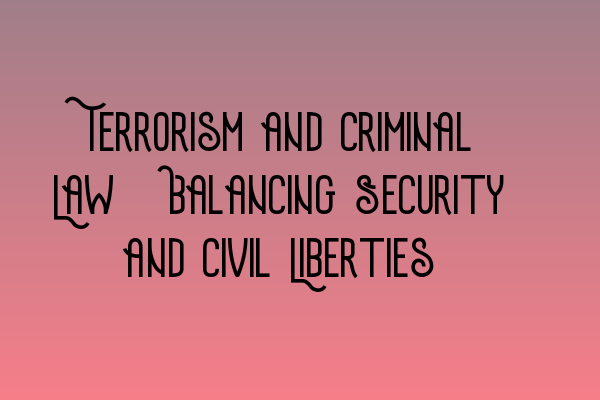Terrorism and Criminal Law: Balancing Security and Civil Liberties
Terrorism is a grave threat to society, and governments around the world employ criminal law to combat it. In this article, we will explore the delicate balance between security and civil liberties in the context of terrorism.
The Importance of National Security
In an age where terrorism has become increasingly sophisticated and globalized, governments face the daunting task of safeguarding their citizens. National security measures are essential to identify, prevent, and respond to terrorist threats effectively.
However, as governments implement measures to enhance security, concerns regarding the erosion of civil liberties arise. It is crucial to strike a balance that allows the state to protect its citizens without unduly infringing upon their rights.
The Role of Criminal Law
Criminal law plays a vital role in addressing terrorism. It provides a legal framework within which acts of terrorism are identified, prosecuted, and punished. By criminalizing terrorist activities, governments can curtail the operations of terrorist groups, disrupt their financing, and dismantle their networks.
Nevertheless, it is crucial to ensure that the application of criminal law respects fundamental principles of fairness and due process. Adequate legal safeguards must be in place to prevent any abuse of power and protect the rights of individuals suspected or accused of terrorism.
The Challenges Faced
Finding the right balance between security and civil liberties is a complex task. Governments must develop legislation that empowers law enforcement agencies to prevent terrorism without encroaching upon the rights and freedoms of their citizens.
Some of the challenges faced include:
- Surveillance: The use of surveillance technologies and bulk data collection raises concerns about privacy and the potential for abuse.
- Preventive Detention: Detaining individuals without charge or trial for extended periods raises concerns about habeas corpus and the presumption of innocence.
- Freedom of Speech: Balancing the need to restrict incitement to violence or hate speech with protecting freedom of expression.
- Effective Investigation: Striking a balance between the need for comprehensive investigations and respecting the rights of suspects during the investigative process.
The Way Forward
To address these challenges, it is essential for governments to prioritize the development and implementation of robust legal frameworks that strike a delicate balance between security and civil liberties.
Legal professionals play a crucial role in ensuring the protection of civil liberties while supporting national security efforts. Proper training and education, such as the SQE 1 Preparation Courses and SQE 2 Preparation Courses, equip legal professionals with the necessary knowledge and skills to navigate the complexities of terrorism and criminal law.
Furthermore, law firms like SQE Criminal Law & Practice Law UK offer expert legal advice and representation in cases involving terrorism-related charges. Our team of experienced solicitors ensures the protection of our clients’ rights throughout the legal process.
In conclusion, striking a balance between security and civil liberties is a complex yet essential task in combating terrorism. By upholding the rule of law and respecting fundamental rights, governments can effectively address the threat of terrorism while preserving the democratic values that define our society.
For more practice and preparation materials related to criminal law and terrorism, we recommend exploring the following articles:
